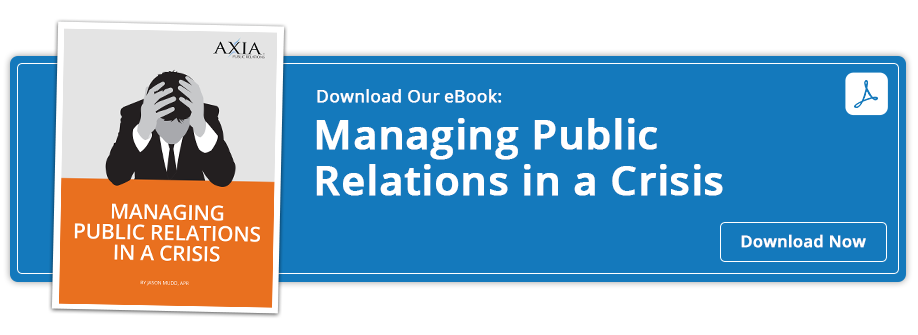 PR communications in a crisis must be handled with empathy and sensitivity
PR communications in a crisis must be handled with empathy and sensitivity
Given the reality of 24-hour news, both large and small events receive intense scrutiny during a crisis. The larger networks, in an effort to cater to the American public, will switch to real-time events. Any type of news – good or bad – can become top billing in today’s news cycle. Stock market gains, job market changes or violent crises all can take the main stage for viewership.
In recent days, mass shootings have resulted in intense media coverage. The Washington Post reports there are now more mass shooting than days in the year. While response to such tragedies are appropriately handled through emergency operations personnel, public relations plays a crucial role in communicating with responders, area residents and workers, as well as interested people throughout the world.
When a negative situation starts to unfold – markets crashing, a company’s merger that could impact stockholders or a disaster situation – a person’s ability to understand key messages becomes greatly diminished. Your company’s communications take on more significant meaning in an organizational crisis. Following are some critical points to remember for communicating through a crisis.
Content becomes more important during an emergency or crisis.
General audiences experiencing stressors have a reduced capacity to “hear” complex messages and essentially only comprehend on an eighth grade reading level (or even less). Typically, people cannot hear and remember more than three items – so laundry lists are not helpful during an emergency. And, it is imperative for companies to provide a single, clear call to action at the early stages. For example, when teaching CPR methods, there is always a person who is told, “go call 911” while CPR is administered to ensure that the critical action is completed in the quickest fashion.
Timing of delivery helps connect to listeners.
Of course, the timing is always important, but anxiety accelerates the perceived need for information. In our era of instant gratification, everyone is conditioned to have instant access to information. In normal business, there are established times for quarterly earnings reports and changes in executive leadership. In uncertain times, the volatility of the environment increases the desire for knowledge from leadership.
Empathy and brevity are musts.
Smart steps should be taken during company press conferences to deliver information that is positively received, even if it’s bad news. Showing empathy does not convey weakness; rather, it offers a visual cue and a tone of voice that demonstrates your company shares the concerns of your clients and the community. Your company spokespeople must endeavor to be sensitive when delivering messages, particularly messages that have negative content.
Also, your communication should be succinct. Too often companies deliver drawn-out rhetoric or stumble through their messages. If your spokesperson repeatedly says, “I don’t know” or conveys an attitude of “I’m just here because we told you we would be,” your organization’s reputation is immediately diminished, and you will spend a lot of time and money recovering from that sound byte.
The professionals at Axia PR can prepare your personnel to deliver information with empathy, sensitivity and credibility during an emergency or crisis. Download your copy of our crisis management e-book to learn more about preparing your company for a crisis.
 Heather M. Hilliard is an expert in crisis management communications. With two master’s degrees and her international Certified Emergency Manager credential, she has worked through disasters as well as “normal business” for large- and small-scale events in a variety of industries. She is an adjunct professor at Tulane University and currently focuses on strategic communications and improvements for clients.
Heather M. Hilliard is an expert in crisis management communications. With two master’s degrees and her international Certified Emergency Manager credential, she has worked through disasters as well as “normal business” for large- and small-scale events in a variety of industries. She is an adjunct professor at Tulane University and currently focuses on strategic communications and improvements for clients.Topics: public relations, crisis communications, shared media



Comment on This Article